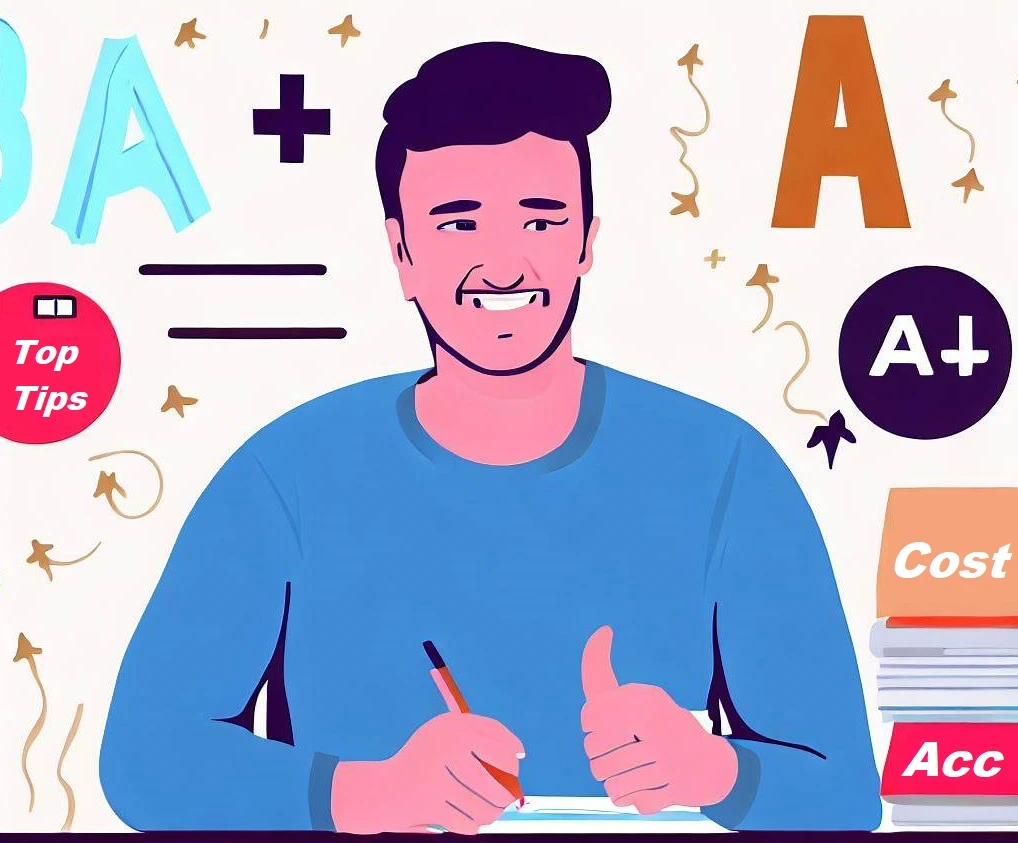Top Tips for Scoring an A+ on Your Cost Accounting Exam

One of the most important topics in business studies is cost accounting. Students must possess a thorough understanding of the material as well as efficient exam preparation techniques in order to achieve an A+ grade on the cost accounting exam. They should concentrate on comprehending the fundamental ideas, practice using real-world examples, effectively manage their time, and adhere to effective exam preparation techniques. Additionally, students should concentrate on writing well-formatted, clearly explaining the concepts in their responses, and whenever possible, using tables and diagrams. This blog will give students practical advice on how to ace the cost accounting exam, covering crucial subjects like grasping fundamental ideas, efficient study methods, exam-preparation strategies, and advice on how to write answers. Students who use these suggestions and techniques will be able to pass the cost accounting exam with an A+ grade and increase their understanding of the material.
This blog offers practical online exam help for students to ace cost accounting exams with expert tips on comprehending fundamental ideas, using real-world examples, time management, and well-formatted responses with tables and diagrams.

Understanding the Basic Concepts
Students must understand the fundamental ideas in order to achieve an A+ on the cost accounting exam. They should be aware of the distinctions between cost accounting and financial accounting as well as the various categories of costs, including direct, indirect, fixed, and variable costs. The cost accounting cycle, which includes cost accumulation, cost allocation, and cost analysis, should also be thoroughly understood by students. Students can solve challenging problems with ease if they comprehend these fundamental ideas.
Students should be aware of the distinction between cost accounting and financial accounting, specifically that cost accounting aids businesses in internal decision-making while financial accounting concentrates on providing information to external stakeholders. Variable costs rise or fall depending on the level of production, whereas fixed costs do not change with changes in production. While indirect costs are necessary expenditures for a business but cannot be directly connected to a product or service, direct costs can be directly linked to a good or service.
Understanding Cost Accounting Cycle
Students must have a solid understanding of cost accumulation, cost allocation, and cost analysis in order to comprehend the cost accounting cycle. Cost allocation entails allocating costs to goods or services, whereas cost accumulation entails the collection of cost data. Making decisions involves using cost data that has been interpreted.
Students should become familiar with job costing, process costing, and activity-based costing in order to better understand cost accumulation. Process costing is used for mass-produced goods, whereas job costing is used for one-of-a-kind goods or services. With activity-based costing, costs are distributed according to the activities that produce them.
Importance of Cost Concepts
Making wise business decisions requires an understanding of the various cost categories, including fixed, variable, direct, and indirect costs. Variable costs are important in determining the cost-volume-profit relationship, while fixed costs are important in determining the breakeven point. While indirect costs are crucial for figuring out overhead costs, direct costs are crucial for figuring out the profitability of specific goods or services.
Students who comprehend the significance of these cost concepts can analyze business operations and suggest ways to cut costs and boost profitability.
Role of Cost Accounting in Decision Making
By providing cost information for various business activities like production, marketing, and distribution, cost accounting aids businesses in making wise decisions. Businesses can find areas where they can cut costs, boost efficiency, and boost profitability by analyzing this data.
Cost accounting, for instance, can assist businesses in identifying the most lucrative goods or services and in allocating resources accordingly. Examining the relationship between the cost-volume-profit can also assist businesses in determining the best pricing strategy. Students can apply these ideas to real-life situations and make wise decisions in their future careers by comprehending the role of cost accounting in decision-making.
Effective Study Techniques
The use of efficient study methods is essential to achieving an A+ on the cost accounting exam. Students should make a study plan, concentrate on comprehending the ideas rather than memorization, and use examples from real-world situations to deepen their understanding. To dispel their doubts and improve their learning, they should also make use of study materials like textbooks, online resources, and study groups.
Students should first determine their strengths and weaknesses before allocating their time to create a study plan. Additionally, they ought to divide the topics into manageable sections and establish a deadline for finishing each one. Instead of just memorizing the material, students should concentrate on understanding it and using it in practical contexts. Students can clarify their questions and build on each other's strengths when they study in a group, which is also advantageous.
Utilizing flashcards to enhance learning
Students can benefit from using flashcards to aid in the memorization of important terms and ideas. Students can increase their retention of the material by reviewing it frequently by making flashcards with key terms and definitions. Flashcards can be used to assess oneself and determine what needs more in-depth review.
Making use of practice problems
Students can strengthen their understanding of important concepts by practicing problems. Students can assess their strengths and weaknesses and work to strengthen their problem-solving abilities by working through practice problems. By simulating real-world scenarios and testing students' ability to apply the concepts they have learned, practice questions can also aid in exam preparation.
Staying organized and managing time effectively
Success in cost accounting requires strong organizational and time management abilities. Establishing and adhering to a schedule will help students allocate time for reading, reviewing, and solving problems. They ought to use digital folders or binders to keep their study materials organized and simple to find. Students can prevent procrastination and make sure they are well-prepared for exams by remaining organized and using their time wisely.
Exam Preparation Strategies
Students should create a thorough revision plan that includes going over the course materials, practicing past exam questions, and taking practice exams if they want to get an A+ on the cost accounting exam. They should also effectively manage their time, concentrate on crucial subjects, and refrain from cramming. Additionally, students should get enough rest the night before the test and take care of their physical and mental well-being.
Students should prioritize the key points and pay particular attention to them during revision. Students can understand the format of the exam and be more prepared by practicing past exam questions. Students can identify areas for improvement and learn how to manage their time efficiently on exams by taking practice exams. Finally, in order to perform at their best on the exam, students should take good care of their physical and mental health, engage in regular exercise, and get enough rest.
Time Management Tips
Success in cost accounting exams is largely dependent on efficient time management. Students should set priorities for their work, refrain from putting things off, and allow enough time for each revision session. To stay organized and on schedule, they can use time management tools like calendars and to-do lists. Additionally, to keep their minds fresh and prevent burnout, students should take frequent breaks during their study sessions.
Note-Taking Techniques
Students who take good notes are more likely to remember information and comprehend concepts more fully. To encapsulate key ideas, students should use diagrams, acronyms, and shorthand. Additionally, for easier reference, they can color-code their notes or highlight pertinent information. Students can also draw mind maps to see how various ideas and subjects relate to one another.
Exam-Day Strategies
Students should be on time for the exam, bring any necessary supplies, like pens and calculators, and carefully read the instructions. Additionally, they ought to use their time wisely and allow enough time for each question. They should move on to the following question and return to the one they got stuck on later. Finally, pupils should maintain their composure and confidence in their preparation and knowledge.
Tips for Writing Answers
Writing good answers is essential for getting an A+ on the cost accounting exam. When possible, students should use tables and diagrams along with appropriate formatting and clear concept explanations. In addition, they should give a direct response to the query, offer pertinent examples, and omit irrelevant details. Finally, students should carefully read and comprehend the question and plan their time wisely to answer all of the questions within the allotted time.
Students should format their responses properly, using headings, subheadings, and bullet points to set their ideas in order. To bolster their responses, they should also clearly define the concepts and offer pertinent examples. When possible, use tables and diagrams to convey information succinctly and clearly. Students should also directly respond to the question, including only pertinent details and omitting extraneous ones. It is crucial to carefully read and comprehend the question and allocate their time wisely in order to respond to all of the questions within the allotted time.
Use Clear and Concise Language
It's critical to use concise language when composing your answers for a cost accounting exam. It can be challenging to understand your answers if you use technical jargon or excessively complex terms, which could result in a lower grade. Instead, try to use straightforward, understandable language. This will ensure that you receive full credit for your response and make it simpler for the examiner to understand your thought process. Additionally, avoiding common errors like repetition and veering off-topic by using clear, concise language can help.
Back Up Your Answers with Evidence
It's crucial to support your claims with evidence if you want to make sure that your responses are accurate and convincing. This can include case study examples, quotes from professionals in the field, or statistical information. You can show that you have a thorough understanding of the ideas and can use them in practical situations by backing up your claims with examples. Additionally, using examples can help set your responses apart from those of other students, improving your chances of earning a high grade.
Review Your Answers Before Submitting
Examine your answers carefully before submitting your cost accounting exam. Verify your arguments for any errors in your calculations, spelling, or grammar. Reviewing your responses will help you find any mistakes you may have missed and make sure they are as convincing and understandable as possible. Reviewing your responses can also show you where you might need to spend more time during the exam, allowing you to plan your time more efficiently. Take the time to carefully review your answers because even minor errors can result in a lower grade.
Conclusion
In conclusion, obtaining an A+ on the cost accounting exam necessitates a thorough knowledge of the material and efficient exam-preparation techniques. Students should concentrate on comprehending the fundamental ideas, practice with real-world examples, manage their time wisely, and adhere to efficient exam preparation techniques. They should also concentrate on writing well-formatted answers that clearly explain the concepts and, when applicable, make use of tables and diagrams. Students can succeed in their business studies and earn an A+ on the cost accounting exam by using these strategies.